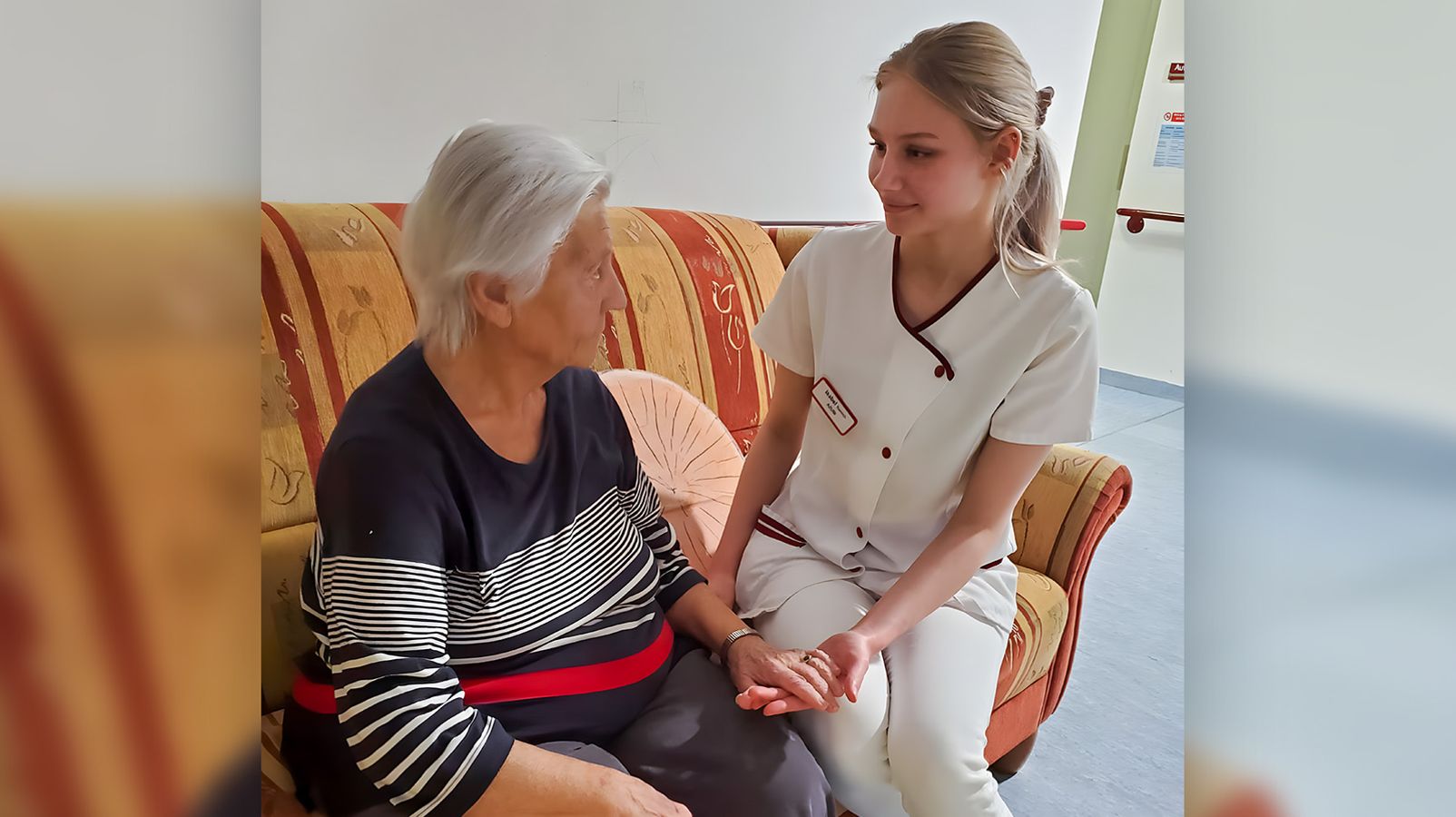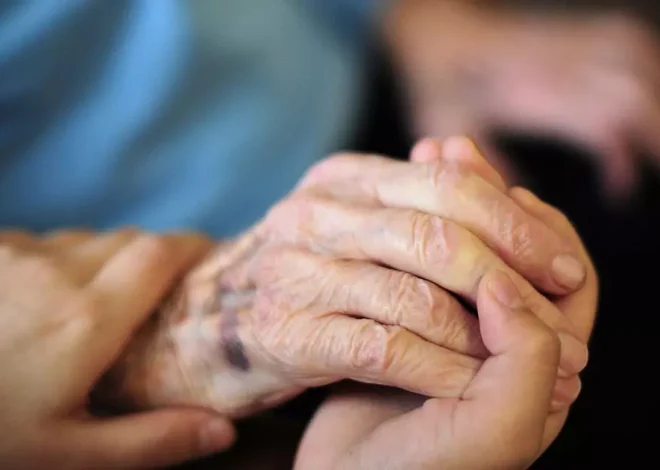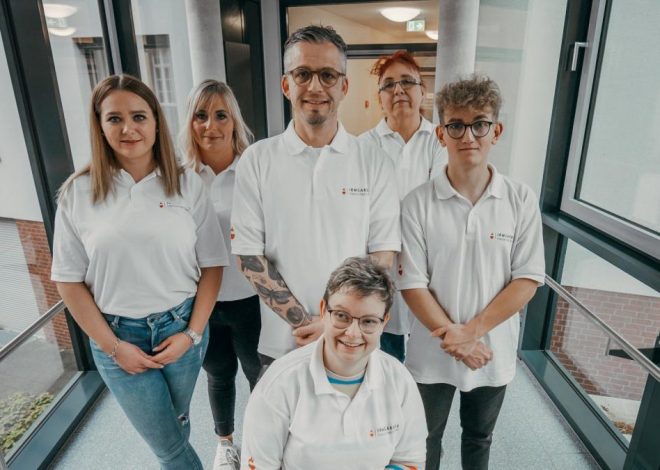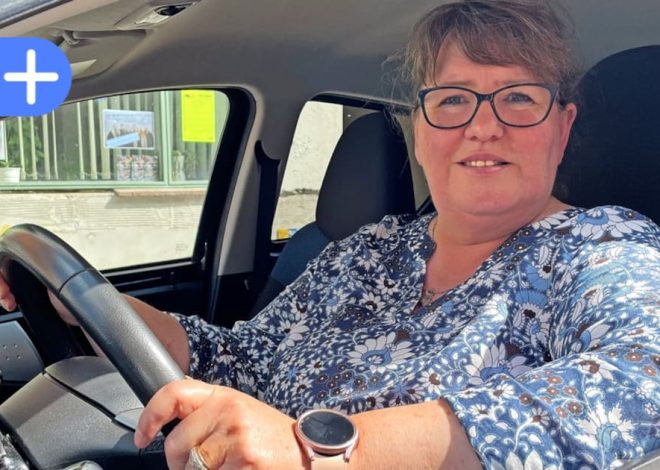
Tour de Care is intended to show: “Care is more than just washing!”
“Yes, I have often said that I love my job,” says nursing student Isabel Ramich. She is in her third year of training at the Dillingen nursing school. Her training facility is the Heilig-Geist-Stift, a retirement home in Dillingen. The young woman wants to clear up one prejudice in particular: “People always say that we only have to wash. But the work is much more than that. You are actively involved with the residents, we treat them, make them healthy again. That gives me joy.”
“Tour de Care” aims to provide insights into hospitals and retirement homes
To convey this, she is taking part in the “Tour de Care” in Dillingen. Her place of work, the Heilig-Geist-Stift, is a stop for the participants. There, the trainee will show, together with other trainees and her practical trainer in the home, her practical supervisor, what her everyday work looks like. She also wants to dispel another prejudice: many people fear high physical strain, for example when residents have to be lifted out of bed. But there are aids that make this much easier. This will be demonstrated on site.
People are getting older and older – there are not enough nursing staff coming
The aim of the tour is to attract more people to work in nursing. There is a large shortage of skilled workers in this field: according to a recent study by the Association of Nurses in Bavaria (VdPB) (external link), the point will probably be reached before 2030 where fewer people are being newly trained in these professions than are leaving due to age. At the same time, the proportion of people over 75 in society is increasing significantly. According to the VdPB, in 2022, 604 people with training in nursing were registered as unemployed in Bavaria, and the unemployment rate was 0.49 percent. This was offset by 2,999 vacancies.
Salary and working hours have improved
A lot has improved in her job, stresses Alla Schander, head of nursing at the Heilig-Geist-Stift in Dillinger. Working hours have become more flexible, and you can arrange things so that you can easily combine them with your family. The pay has also improved a lot. Depending on how long you have been in the profession, your position and your training, the average gross annual salary in nursing is between 30,000 and 50,000 euros. “This is also usually communicated differently,” she says. She would learn the job again at any time. Of course, it can be stressful and exhausting at times. But it is also nice: “You get so much back from the residents. They are grateful. That’s why it would be great if young people in particular would think along these lines,” she says.
Nevertheless, there are not enough nursing staff. Although 60 to 70 students start their training in the Dillingen district every year, not all of them will later work as full-time nursing staff. Many only return part-time after parental leave. And, says Angelika Wolf, head of the Wertingen nursing school, some students are put off because they are constantly called to help out, even on their days off. That is a burden. If there were enough nursing staff, that would happen less often.
Take a look, try it out, ask questions
The “Tour de Care” was launched to inform potential new nursing staff about all of this. It was organized by Martina Meitinger from the nursing center in the district of Dillingen, among others. The aim was to give participants the opportunity to “take a look” at the facilities without any obligation and thus give them an insight into the career opportunities in the area of hospitals (acute care) and retirement homes (long-term care), said Meitinger.
The stops are the hospitals in the district, retirement homes and a medical supply store. There is a rally that takes you through the two hospitals and into rooms that are otherwise not so easy to get into. You can also try out lots of things, such as how to use a stair lift. There is also information about the training process, payment and working time models. It’s not just about training to be a nursing professional, emphasises Andreas Frech, head of nursing at the hospital in Dillingen. There are so many areas in which you can work, not just directly with patients, but also in the kitchen, in the laundry, in technology or administration. Representatives of the nursing schools in the district will also be there and provide insights.
Generalist nursing training: The “holistic” approach is praised
Anyone who wants to become a nurse has to complete three years of “general nursing training”. This has only been available in this form for four years. Before starting the training, you had to decide what exactly you wanted to do later. For example, whether you would prefer to work in a nursing home or in a hospital. Today, students are trained in all disciplines, including child care or psychiatry, and only have to specialize later.
There were many critics at the beginning: the training was too superficial if several professions were to be learned in three years, they said. Hannelore Muras, a long-standing nursing professional who is responsible for training trainees at the Heilig-Geist-Stift, also admits: It “took some getting used to” and you had to “completely adapt”.
Today, however, she sees many advantages. The trainees bring medical knowledge from the hospital to the retirement home, but can also take something with them from the nursing home, such as the intensive personal interaction with people. “I think the holistic approach is great,” says Bohlenbach. “In the past, people in hospitals often said: ‘Oh, elderly care’ – and the same applies the other way round. Now that is slowly disappearing.” There is a respectful way of dealing with one another, and that is the nice thing about it for her.
Communicate knowledge and passion for the profession
The Tour de Care is intended to pass on some of this joy in the job to the participants. Nursing student Fadi Abdallah also wants to make a contribution to this. He came from Syria in 2017, where he was a journalist. He wanted to work quickly in Germany. A position as a nursing assistant came up. Because he liked the work so much, he wanted to be able to do more, so he is now training to be a nursing specialist. His goal is for the residents to feel comfortable: “If they are doing well, then I am doing well too,” he says. After his training, he wants to continue working at the Heilig-Geist-Stift and says, “We are a family here. This is not just a job, but also a home for me.”
The meeting point for the Tour de Care is on Saturday at 9 a.m. at the Dillinger Hospital. The afternoon tour begins at 2 p.m. at the St. Clara retirement home in Wertingen. Anyone who wants to take part can register by Saturday (March 16), 8 a.m., at the Dillingen Hospital (Andreas Frech, Tel. 09071/578016 or [email protected]).

Ethel Purdy – Medical Blogger & Pharmacist
Bridging the world of wellness and science, Ethel Purdy is a professional voice in healthcare with a passion for sharing knowledge. At 36, she stands at the confluence of medical expertise and the written word, holding a pharmacy degree acquired under the rigorous education systems of Germany and Estonia.
Her pursuit of medicine was fueled by a desire to understand the intricacies of human health and to contribute to the community’s understanding of it. Transitioning seamlessly into the realm of blogging, Ethel has found a platform to demystify complex medical concepts for the everyday reader.
Ethel’s commitment to the world of medicine extends beyond her professional life into a personal commitment to health and wellness. Her hobbies reflect this dedication, often involving research on the latest medical advances, participating in wellness communities, and exploring the vast and varied dimensions of health.
Join Ethel as she distills her pharmaceutical knowledge into accessible wisdom, fostering an environment where science meets lifestyle and everyone is invited to learn. Whether you’re looking for insights into the latest health trends or trustworthy medical advice, Ethel’s blog is your gateway to the nexus of healthcare and daily living.



